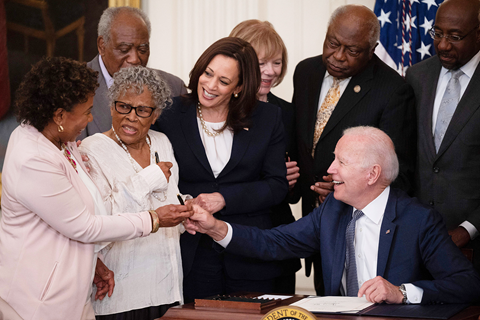Observing Juneteenth in the Workplace
For only the second year in a row, Juneteenth is being observed as a federal holiday in the United States next week. Also known as Jubilee Day, Freedom Day, Black Independence Day, and Emancipation Day in some areas, Juneteenth has been celebrated as a day of commemorating the emancipation of enslaved African Americans since the mid-1800s. It is observed on June 19, the anniversary of Union Army Major General Gordon Granger’s 1865 proclamation of freedom for enslaved people in Texas, the last Confederate state with institutional slavery. The pronouncement came a full two and a half years after President Abraham Lincoln had issued the Emancipation Proclamation.
The holiday first took hold in Texas after Granger’s announcement, and continued to spread throughout the nation as an important day of celebration for African Americans. However, the Jim Crow era saw a decline in Juneteenth celebrations as Black people continued to be disenfranchised and excluded from the political process. Not until the 1960s did Juneteenth see a large revival in observance – the end of the Civil Rights Movement reinvigorated the popularity of the holiday as more cities began holding official large-scale celebrations.

Opal Lee, the grandmother of Juneteenth, with President Joe Biden and Vice President Kamala Harris.
In 2021, President Joe Biden declared Juneteenth a federal holiday, the first time a new holiday has been added since Martin Luther King Jr. Day was declared a federal holiday in 1986. However, draft legislation to do so has existed in U.S. Congress since 1996. Activists have been fighting for Juneteenth to be recognized at the national level for a long time. In 2016, a retired counselor and teacher named Opal Lee (often referred to as the grandmother of Juneteenth) symbolically walked from her hometown of Fort Worth, Texas to Washington, D.C. at the age of 89. Her hope was to speak to President Barack Obama directly and ask for Juneteenth to be federally recognized. Four years later, in 2021, Congress finally passed a bill to declare Juneteenth a federal holiday, and President Biden signed the bill into law with Opal Lee by his side. More and more organizations are recognizing the importance of Juneteenth and giving their employees a day off to celebrate and reflect.
Last year, the Cooke Foundation formally observed Juneteenth as a holiday for the first time. For our second annual Juneteenth celebration, Foundation Staff will take a tour of the Loudoun Freedom Center’s burial grounds and plantations (later in the week, after Staff have been given the holiday off). While the violence against formerly enslaved people in our own backyard has been documented for centuries, the National Register of Historic Places mentions Belmont Plantation but not the burial site. By taking a tour, we will be able to gather context and reality right from the source.
Learn more about the history behind Juneteenth, and how you can celebrate at the Juneteenth Foundation website.